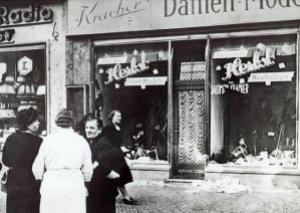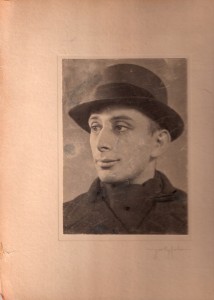We remember Kristallnacht on the International Day against Fascism and Anti-Semitism

Kristallnacht 9 November 1938
November 9th marks the anniversary of Kristallnacht. It is also the annual International Day against Fascism and Anti-Semitism.
Kristallnacht (night of broken glass) is the name given to the fateful night in 1938 when Nazi hordes ran wild throughout Berlin and many other German cities, smashing windows, looting and destroying Jewish businesses, education centres, homes and synagogues. Jewish houses of worship were desecrated and then set afire. Thousands of Jews were rounded up, some beaten to death, others sent to concentration camps, Jewish artefacts, books and records were destroyed forever.
First-hand accounts of that night grow ever more scarce. 77 years have passed. Many of those arrested or sent directly to concentration camps that night perished in the Holocaust. One such first hand account of Krystallnacht has been published today in the Wall Street Journal by a Mr. Lang:
I will never forget seeing the unimaginable horror of the night and the following day 77 years ago. By luck, my parents were not in Berlin. I was at my grandmother’s. Through the window I could see my beautiful synagogue engulfed in flames as desperate screams rose from the street below. Each knock on our apartment door brought terror, followed by incredible relief. By some miracle, two of my uncles made it to my grandmother’s seeking safety from the savagery of this night.
The next morning as I wandered through my neighborhood, I saw shards of plate glass everywhere, as every Jewish-owned shop had been looted and painted with vile Jew-hating slogans. Uniformed Nazis and their sympathizers were having fun as they surveyed their brutality. One group looked at a large stain on the street that was said to be the blood of a Jew. Even now I can hear their laughter.
Mr Lang was lucky enough to get a place on the Kindertransport and fled Germany. Arriving in the USA in 1940. He point’s out that once again, the world is aware of racially motivated attacks on civilians, just like those the Jews experienced on Kristallnacht. Today, Christians in the Middle East fear the same horrors and fears. Whilst many governments are quick to condemn the horrors playing out in the middle-east, there is little desire to come to their rescue. This makes the 2016 theme of Holocaust Memorial Day even more important. ‘Don’t Stand By’ speaks as much of the world today as it does to the mistakes of the past that allowed The Holocaust to happen.
In another article, this time for Times of Israel, Judy Lash Balint writes about her family’s experience of Kristallnacht and The Holocaust:
On November 9, 1938, my father, Werner Leschziner, 27, was at work at the Handelsbank Ivria in Leipzig. That night he was dragged out of his rented room at Nordplatz 2 and thrown, together with thousands of other Jews, into the Buchenwald concentration camp…
Werner Leschziner, survivor of Kristallnacht and The Holocaust
My mother’s parents [Avraham and Ida Ehrenreich] fled ahead of the Nazis to Antwerp and then to France, where they were rounded up and sent to a series of camps near the French Pyrenees. Eventually, in August 1942, they were transported by the French national railroad to Drancy and arrived in Auschwitz on September 11 1942. Both then in their 50s, they didn’t survive another day…
…On Kristallnacht 2015, I mark not only the fate of those like my father, who endured but survived Buchenwald, and my grandparents who perished in Treblinka and Auschwitz, but the ongoing injustice and refusal of the guilty nations to acknowledge the suffering and offer up anything resembling meaningful reparations.
So today, on International Day Against Fascism and Anti-Semitism, on the anniversary of Kristallnacht, a prelude to The Holocaust, known about by Government’s around the world, Government’s who knew of events occurring in pre-war Germany and who stood by,
I urge you to think about the theme of Holocaust Memorial Day 2016 and ask one thing of you: Don’t stand by. Do something to educate, inform, remember – every act of memory and commemoration is an act in the name of those that perished in the Holocaust and helps reduce the chance of history repeating itself yet again.
For more information about Bristol Holocaust Memorial Day events, please keep checking our website or like the Bristol HMD Facebook page. Holocaust Memorial Day takes place on 27th January every year.

